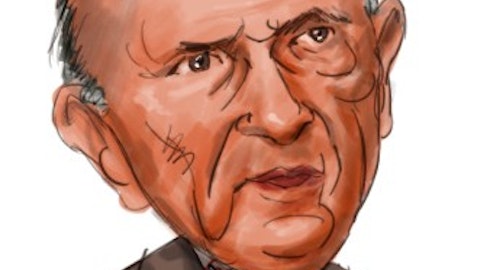Ray Dalio‘s Bridgewater was the most successful hedge fund in the world in the last two years. Last year, its profits were higher than Google (GOOG), Amazon (AMZN) and eBay (EBAY) combined. Bridgewater is a global macro fund, meaning that it bases its investments on world events and the way those events cause markets to shift. Dalio started the fund in NYC in 1975 and has since grown it to a portfolio value over $125B. Charlie Rose invited Dalio on his show to talk about his views on the economy. (video of the interview is available here).

Ray Dalio’s ‘Economic Machine’
Ray Dalio sees the issues plaguing the world financially, be it at a global, national or personal level, as the result of the “Economic Machine.” Dalio uses this term to describe economic facts and their inevitable consequences – cause and effect. He explains that if debt rises with income, there will be a point where the debtor can borrow no more. At this point, deleveraging is a necessity. This sets off a chain reaction. There were people and businesses that had made money off the amount borrowed. These entities see their respective incomes go down when the debtor deleverages. Right now, the developed world, like the US or the EU, are in the role of debtor. This leaves an opening for emerging countries like China to take on the role of creditor. In turn, this produces a credit bubble in the latter’s economic systems, which can be dangerous as the US saw when the housing bubble burst. Dalio explains that these are facts and largely inevitable. He notes that the same thing happens every ten years and it takes roughly that long for the economy to get back on track. Spreading it out in this way is necessary. Dalio explains, “the key is to spread it out as much as you can to make sure that it’s not disorderly.”
Ray Dalio Explains the Problem – If It Doesn’t Make Dollars, It Doesn’t Make Sense
Ray Dalio continues by explaining that right now criticizing and blaming is the problem. Nothing is accomplished this way, besides there is no real blame to be ascribed. This is the “economic machine” at work. To Dalio, the only way to develop a solution is to gather thoughtful people together to open dialogues, dialogues with statements that start more with “I wonder” than “I think.” He says that “ego” cannot be allowed to stand in the way of understanding and developing a solution that meets the needs of all parties. Also, he believes that any investment made during deleveraging has to be income producing in some way. Throwing money at a problem won’t solve anything. For example, as technology increases, people are not needed as “tools” any longer. These persons need gainful employment. Extending benefits and encouraging companies to expand will not solve the issue because the actual problem is not being addressed. Dalio says that he would gladly contribute half his income if it would go toward solving the actual problems, not just their symptoms. Further, the government needs to do this if it is going to solve the private debt issue which is just as significant as public sector debt. This is why fiscal policy will not be stimulative and the monetary policies that have worked before won’t work now – the whole “no tools in the toolbox” philosophy.





